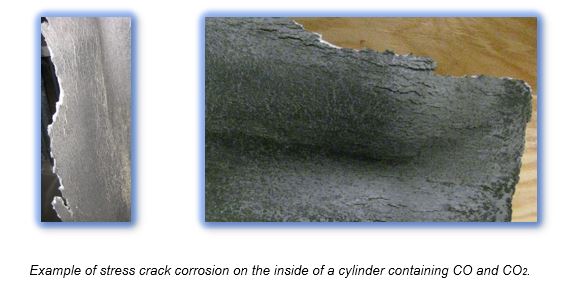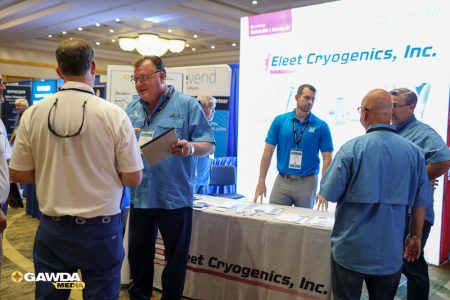Specialty, Industrial, Food and Medical Gas Safety Alert
Mixtures containing Carbon Monoxide & Carbon Dioxide in steel cylinders
This GAWDA Safety Alert is issued to inform GAWDA members of potential cylinder damage resulting from internal stress corrosion where carbon dioxide and carbon monoxide are filled in steel cylinders. In the past, cylinders have violently ruptured causing significant damage.
Carbon monoxide and carbon dioxide are present in many mixtures. Recently, food gas mixtures (meat processing gas) and laser mixtures have been widely produced.
If you are filling mixtures containing carbon monoxide, carbon dioxide, with or without other balance gases, in steel cylinders, it is highly recommended that you obtain CGA P-57, Avoidance Of Failure Of Carbon Monoxide And Of Carbon Monoxide/Carbon Dioxide Mixtures Cylinders. https://portal.cganet.com/Publication/Details.aspx?id=P-57
CGA P-57 is available for free to GAWDA members who participate in the GAWDA/CGA Safety Program. To get more information about this GAWDA benefit, see: https://www.gawda.org/resources/cga-subscription-program/
CGA P-57 contains specific information about the reactions inside the cylinder, precautions and recommendations to follow when removing cylinders from this service.
It is also highly recommended that you have and carefully follow written procedures to help reduce the potential for violent cylinder failures caused by filling steel cylinders with mixtures containing carbon monoxide and carbon dioxide. Consider the following sample procedure as you develop your SOPs.

Sample Procedure
Mixtures Containing Carbon Monoxide and Carbon Dioxide in Steel Cylinders
Critical Personnel Safety Issue
All mixtures in steel cylinders containing Carbon Monoxide (CO) and Carbon Dioxide (CO2) must be extremely dry to reduce the likelihood of stress-corrosion. See CGA P-57, Avoidance Of Failure Of Carbon Monoxide And Of Carbon Monoxide/ Carbon Dioxide Mixtures Cylinders. There have been multiple cases where the cylinder sidewall of CO/CO2 mixture cylinders have violently ruptured.
Mandatory Safe Practices:
- CGA P-57, Avoidance Of Failure Of Carbon Monoxide And Of Carbon Monoxide/Carbon Dioxide Mixtures Cylinders:
- Obtain a copy of CGA P-57 and have it available for cylinder filling personnel
- Assure personnel filling cylinders containing CO and CO2 have been trained on the material in CGA P-57 and are aware of the potential consequences of failure to follow the CGA recommendations.
- Dry Cylinders – Assure each steel cylinder which will be filled with mixtures containing CO and CO2 is dry before filling.
- Mandatory Moisture Testing – Assure each steel cylinder which has been filled with mixtures containing CO and CO2 is individually tested for moisture content after filling and homogenization.
- For cylinders with a maximum working pressure under 2180 psig (for example, some “200” style steel cylinders), the maximum moisture content is 7 ppm
- For cylinders with a maximum working pressure over 2180 psig, the maximum moisture content is 5 ppm.
- Alternatives:
- Consider using an Aluminum cylinder for mixtures which will contain CO and CO2
- CGA P-57 contains other recommendations and alternatives
- Change of Service:
- Follow the specific recommendations in CGA P-57 when changing the service of cylinders that have contained CO and CO2.
- Personnel Safety:
- Assure that the sampling process (cylinder connection to the regulator, purging, venting, etc.) does not expose personnel to Carbon Monoxide. Consider remote vent outlets and purges to minimize the likelihood of personnel exposure to CO during sampling.
- Pipe away the moisture analyzer sample stream and sample bypass to minimize the likelihood of personnel exposure to CO.
- Consider a Carbon Monoxide monitor in the production area, sampling area and testing area where CO is handled.
This GAWDA Industrial Gas and Medical Gas Safety Alert is issued jointly by Mike Dodd and Tom Badstubner, your GAWDA DOT and FDA consultants. Please contact Mike Dodd ([email protected]) or Tom Badstubner ([email protected]) for further information.




